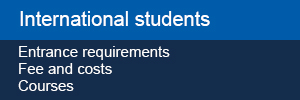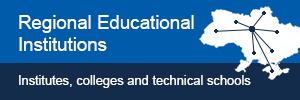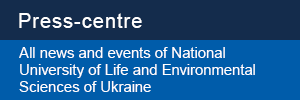Master training in еducational program «035 Philology»
Faculty of the Humanities and Pedagogy
Dean – PhD in Philosophy, Аssociate professor I. Savytska
tel.: (044) 527-80-83
E-mail: [email protected]
Location: Building № _3_, room _101__
Faculty organizes and coordinates educational process of master training in educations programs within specialties:
Specialty 035 “Philology”
Educational program “English and other foreign language”
Guarantor of the educational and professional program – PhD in Philology, Аssociate professor O. Chaika
Educational program “German and other foreign language”
Guarantor of the educational and professional program – PhD in Philology, Аssociate professor N. Olkhovska
Departments in charge of graduate training:
Department of Foreign Philology and Translation
Tel.: (044) 527-80-83
E-mail: [email protected]
Head of department – Doctor of Pedagogy, Professor S. Amelina
Training of masters of sciences
in branch of knowledge "Human sciences"
in specialty 035 "PHILOLOGY "
Specialization 035.041 “Philology (German Languages and Literature) (Including Translation), first – English)
educational program “ENGLISH AND OTHER FOREIGN LANGUAGE”
Specialization 035.043 “Philology (German Languages and Literature) (Including Translation), first – German)
educational program “GERMAN AND OTHER FOREIGN LANGUAGE”
Form of Training: Licensed number of persons:
– Full-time 15
– Part-time 5
Duration of Training 1,5 years
Credits ECТS 90
Language of Teaching Ukrainian, English, German
Qualification Master in Philology
The concept of training
The training of philologists is determined by the state’s demand for specialists engaged in translation and interpretation of scientific literature in agrobiology, environmental protection, economy, engineering and technology, as well as documentation in the field of food quality and safety, exploring contemporary issues of foreign philology and translation, teaching foreign languages at higher educational institutions.
Areas of employment
The Master of Philology has a sufficient qualification level to work in different professional groups according to the State Classifier of Professions, namely:
2444 philologist, linguist;
2444.1 philologist-researcher
2444.2 translator
24325 translator of technical literature.
Practical Training
Practical training is an integral part of the educational process and is carried out according to the educational process schedule directly on authorized practice bases, including: institutions and enterprises of agrarian and environmental profiles of all forms of ownership having translation departments; research institutes and laboratories; translation agencies; higher education institutions.
Proposed Topics for Master Theses
1. Stylistic and cognitive-pragmatic problems of translation of agrarian advertising texts.
2. Reproduction of the linguistic and cultural features of political discourse in Ukrainian translation.
3. Use of electronic databases in the translation process.
4. Features of translation of linguistic means of informative texts in agrarian sector.
5. Terminological borrowings and their translation into Ukrainian.
Master Program and Curriculum
in Specialty «Philology»
Educational-professional program “English and Other Foreign Language”
Educational-professional program “German and Other Foreign Language”
Code n/a | Components of the educational and professionalprogram (education disciplines, course projects (paper), practice, qualification work) | Amount of credits ECTS | The final control |
1 | 2 | 3 | 4 |
1. GENERAL TRAINING CYCLE | |||
Compulsory components EPP | |||
CC 1 | Pedagogy and Psychology of Higher School | 4 | exam |
2. SPECIAL (PROFESSIONAL) TRAINING CYCLE | |||
Compulsory components EPP | |||
CCU2 | Methods of Teaching Translation at Higher School | 4 | exam |
CCU3 | Communication Strategies of the First Foreign Language | 8 | exam |
CCU4 | Communication Strategies of the Second Foreign Language | 8 | exam |
CCU5 | Translation Theory | 6 | exam |
CCU6 | Translation Techniques (the First Foreign Language) | 8 | exam |
CCU7 | Translation Techniques (the Second Foreign Language) | 8 | exam |
CCU8 | Methodology and Organization of Scientific Research with Fundamentals of Intellectual Property | 4 | exam |
CCU 9 | Practical training | 8 | |
CCU 10 | Preparation and defense of a master's thesis | 8 | |
The total amount of Compulsory components | 66 | ||
Optional components EPP | |||
Optional subjects by specialty | |||
Optional subjects by specialty (block 1) | |||
OB 1.1 | Head of the Educational Institution | 4 | exam |
OB 1.2 | Information Technologies in Translation | 4 | exam |
OB 1.3 | Interpretation and Translation of Specialized Texts (Horticulture and Forestry; Ecology and Agronomy; Veterinary Medicine and Animal Science) | 8 | exam |
Optional subjects by specialty (block 2) | |||
OB 2.1 | Comparative Typology of the First Foreign and Ukrainian Languages | 4 | exam |
OB 2.2 | Modern computer translators’ tools | 4 | exam |
OB 2.3 | Interpretation and Translation of Specialized Texts (Agrarian Law; Quality, Standardization and Certification Of Production; Agricultural Machinery, Agricultural Mechanization and Electrification) | 8 | exam |
Optional subjects by Student’s Choice | |||
ВБС 1 | Subject 1 | 4 | test |
ВБС 2 | Subject 2 | 4 | test |
The total amount of Optional components | 24 | ||
THE TOTAL AMOUNT OF EPP | 90 | ||
Annotations of Components in the Curriculum
1. GENERAL TRAINING CYCLE
Compulsory components
Pedagogy and Psychology of Higher School. Higher school and pedagogy of higher school of Ukraine today. The student and the lecturer as the subjects of pedagogical interaction. Principles of higher school didactics. Organizational forms and methods of teaching. Monitoring and assessing students’ knowledge and skills. Organization of education at higher educational institutions. Subject, tasks and methods of psychology of higher school. Age characteristics of students. Psychological foundations of interactive learning. Teaching and learning styles and their correction. Students’ learning motivation. Psychological theories for creating effective teaching methods at higher educational institutions
2. SPECIAL (PROFESSIONAL) TRAINING CYCLE
Compulsory components
Methods of Teaching Translation at Higher School. Didactic basics of translation. Translator’s professional competence. Content of translation training. Teaching translation and training translators at the higher educational institutions of Ukraine. Working out a syllabus in basic foreign languages (department of translation). Organization of students’ self-education.
Communication Strategies of the First Foreign Language. Basic complex of topics for conversations and communicative situations aimed to improve linguistic, educational, strategic, pragmatic, intercultural and professional competences of students. Translation
Communication Strategies of the Second Foreign Language. Basic complex of topics for conversations and communicative situations aimed to improve linguistic, educational, strategic, pragmatic, intercultural and professional competence of students.
Translation Theory. Bases of the translation theory. Translation within Interlingua communication. The problem of determining what translation is. Functions of a verbal message. Pragmatic basis of translation. Hermeneutic and normative aspects of translation. Problematic issue of modelling and evaluating quality of translation. Invariant and the translation unit.
Translation Techniques (the First Foreign Language). Consecutive interpretation of texts into Ukrainian, translation of excerpts into Ukrainian. Oral and written summarization. Listening and interpretation/translation of authentic text passages.
Translation Technique (the Second Foreign Language). Consecutive interpreting into Ukrainian, translation of excerpts into Ukrainian. Oral and written summarization. Listening and translation/interpretation of authentic text passages.
Methodology and Organization of Scientific Research with Fundamentals of Intellectual Property. General description of methodology. Forms and methods of empirical and theoretical knowledge. Methodological principles and concepts. Current problems of modern methodology of science. The system of organization of scientific and cognitive activity. Basic model of scientific research. Searching and processing scientific information. Methods of preparation and design for publications. Scientific and methodological culture.
Optional components
Optional disciplines by specialty (block 1)
Head of the Educational Institution. The organizational principles of the working activity of the head of the educational institution, work of the administrative service of the educational institution, management of disciplinary relations, technologies of managing the institution.
Information Technologies in Translation. Information translation environment. The use of information technologies at stages: preparation, understanding, interpretation of the scientific and technical text, information and reference search, creation of a translation text and selection of translation equivalents, checking the executed translation. Modern systems of machine and automated translation, CAT-systems.
Interpretation and Translation of Specialized Texts (Horticulture and Forestry; Ecology and Agronomy; Veterinary Medicine and Animal Science). Consecutive interpretation of texts on horticulture and forestry, ecology and agronomy, veterinary medicine and animal science. Consecutive interpretation of Ukrainian texts, interpreting excerpts into Ukrainian. Oral and written summarization.
Optional disciplines by specialty (block 2)
Comparative Typology of the First Foreign and Ukrainian Languages. The subject of comparative typology. Types and history of typological research. Methods of typological analysis. Typology of phonetic, lexical, morphological and syntactic systems of compared languages.
Modern computer translators’ tools. The use of information technologies in translation and interpretation. Using computer-aided translation (CAT), computer-aided interpreting (CAI) and remote simultaneous interpretation (RSI) .Management of terminological resources in computer-aided translation systems, which are used to support simultaneous interpretation and computer-aided translation. The study of operations of search, selection, structuring, import, export of terminology, which is organized in the form of specialized terminology databases.
Interpretation and Translation of Specialized Texts (Agrarian Law; Quality, Standardization and Certification Of Production; Agricultural Machinery, Agricultural Mechanization and Electrification). Consecutive interpretation of texts on agrarian law, quality, standardization and certification of production, agricultural machinery, agricultural mechanization and electrification into Ukrainian. Consecutive interpretation of Ukrainian texts, interpreting excerpts into Ukrainian. Oral and written summarization.





